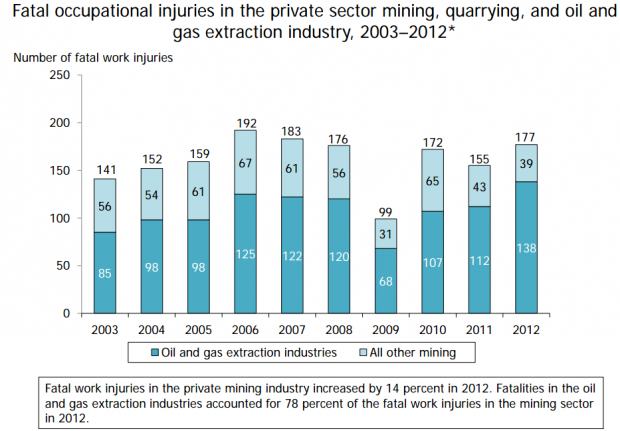Looking at Pipeline Safety After the Chevron Gas Line Explosion
You might have heard that there was a national “Stand Down” yesterday – a day designated to create safety awareness at oil and gas sites in Texas and the rest of the country.
The Occupational Safety and Hazard Administration has been holding these throughout the year, calling on companies to have workers stop for part of the day and focus on safety and training to help reduce accidents in the oil and gas industry. Those accidents have been on the rise, with the number of fatalities more than doubling in the last four years and reaching their highest level in a decade.
“Too many workers are dying in the oil and gas drilling industry,” Dr. David Michaels said at the event in Houston. “Employers need to ensure that jobs are planned out, everyone has adequate training in all aspects of safety and workers need to be part of the planning.”
But chances are the “Stand Down” didn’t catch your eye. Instead you probably read the many headlines about a gas pipeline explosion in Ellis County.
Thursday morning, a construction crew at a Chevon natural gas pipeline just outside the small town of Milford was “performing excavation activities,” according to the company, when a 10-inch liquified gas pipeline was ruptured. The black smoke reached all the way to Dallas, some 50 miles away.
Michael Webber, Deputy Director of the Energy Institute at the University of Texas at Austin, says accidents like this are rare with pipelines.
“But when they have an accident, or an incident – as the industry likes to say – the stakes tend to be higher, because they carry a large volume of product,” he says. “So if something goes wrong, you might have a lot of that product get loose, or you might have a larger explosion or larger fireball, that kind of thing.”
Moving those fuels by train or truck tends to mean smaller volumes, Webber says – and that could mean less of an impact when there is an accident (with the notable exception of a derailment in Quebec in July that killed 47). But you tend to have more accidents with train and trucks then you do with pipelines, Webber says.
“Taken as a whole, releases from pipelines cause few annual fatalities compared to other product transportation modes,” the Congressional Research Service wrote in a report on pipeline safety earlier this year.
But the report notes that when things do go wrong with pipelines, the impact can be much bigger than with trains and trucks. A similar explosion of a natural gas pipeline in Massachusetts last year injured nearly two dozen people and “heavily damaged over a dozen buildings,” the report says.
There were no injuries reported due to the blast, and Chevron says that all of their workers are accounted for. The entire town of Milford (population 729) had to be evacuated, including schools, and may not be able to return to their homes until later Friday night or even Saturday. While the flow of gas has been shut off, it is taking time for the gas still in the pipeline to burn out.
Because the pipeline crosses state lines it’s under federal jurisdiction, not the state’s oil and gas regulator, the Railroad Commission. The Railroad Commission says there was no oil or gas drilling taking place at the site. A spokesman for Chevron apologized yesterday.
While the need for pipelines has grown in recent years to meet the demand brought on by a surge in domestic oil and gas drilling, pipeline accidents are actually down, according to data from the federal Pipeline Hazardous Materials Administration. The number of incidents overall has fallen since 2005 by over a hundred, from 720 that year to 569 incidents in 2012.
What the agency calls “significant incidents” – pipeline accidents involving a fatality, hospitalizations, or high cost – are down as well, from 338 in 2005 to 244 last year.
